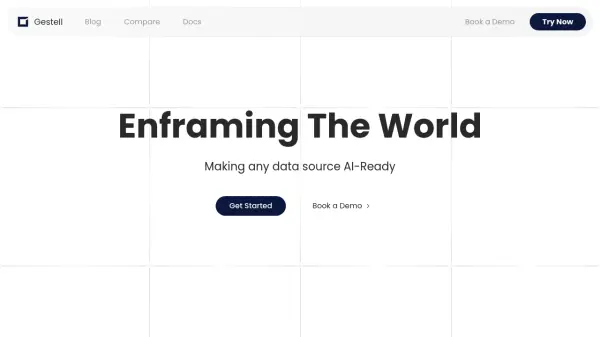What is Gestell?
Gestell functions as an Extract, Transform, Load (ETL) solution tailored for Large Language Models (LLMs). It specializes in converting unstructured data from various sources into structured, AI-ready databases. This transformation process, termed 'Enframing to Disclosure', involves steps like chunking, vectorization, and graph creation, preparing data for efficient use by LLMs. The platform is designed to handle the entire data structuring workflow comprehensively.
By processing data through its integrated steps, Gestell aims to provide accurate and scalable search-based reasoning capabilities for generative AI applications. It offers flexibility, allowing businesses to customize the structuring process based on their specific data and requirements using natural language rules. Users can interact with Gestell through a web workspace or programmatically via its API, supporting diverse data types including PDFs, images, Excel files, presentations, and videos.
Features
- Integrated ETL: End-to-end processing from Enframing to Disclosure.
- Intelligent Chunking: LLM-enabled segmentation for search optimization.
- Multi-modal Ingestion: Handles diverse data types (PDF, Images, Excel, Slides, Video).
- Customizable Vector Store: Tailored database optimized for vector embeddings.
- Integrated Knowledge Graphs: Visualizes contextual relationships within data.
- Accurate Scalability: Maintains precision with large data volumes (50k+ pages).
- Feature Extraction: Identifies and isolates key data characteristics.
- Table Structuring and Extraction: Organizes and retrieves tabular information effectively.
- Web Workspace: Manage data and queries through an intuitive dashboard.
- Agent-First Processing: Utilizes agents throughout data processing and retrieval.
- Security Features: Includes SSO/SAML Authentication, Role-based Permissioning, and Data Encryption.
- Model-Agnostic: Compatible with various AI frameworks or models.
Use Cases
- Building scalable generative AI applications.
- Enabling search-based reasoning on large unstructured datasets.
- Structuring diverse data types (documents, images, spreadsheets, videos) for AI analysis.
- Unlocking insights from complex data sources.
- Developing applications requiring accurate data retrieval and reasoning.
- Optimizing data pipelines for LLM ingestion.
Related Queries
Helpful for people in the following professions
Gestell Uptime Monitor
Average Uptime
99.86%
Average Response Time
207.4 ms
Featured Tools
Join Our Newsletter
Stay updated with the latest AI tools, news, and offers by subscribing to our weekly newsletter.











